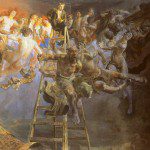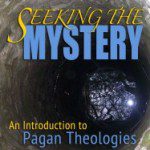 Gerald Gardner believed, as did Margaret Murray before him, that we, as Wiccans (and many Pagans by extension) are the spiritual heirs of the Mystery cults of the ancient world, the best known of which was the Cult of Eleusis. At one time all the major philosophers and leaders of ancient Greece were initiates of the cult. Sworn to keep its secrets, miraculously, none of them ever revealed them.
Gerald Gardner believed, as did Margaret Murray before him, that we, as Wiccans (and many Pagans by extension) are the spiritual heirs of the Mystery cults of the ancient world, the best known of which was the Cult of Eleusis. At one time all the major philosophers and leaders of ancient Greece were initiates of the cult. Sworn to keep its secrets, miraculously, none of them ever revealed them.
On the gates of Eleusis were written the words, “Know Thyself.” This is the greatest challenge facing us as Wiccans and Pagans. In order to be able to become a better channel for the gods, and in order to be more effective at manifesting our magick, we need to be tempered into a better conductor. This is the purpose of the Second Degree initiation in some traditions. A symbolic death and rebirth helps us to clear away the dross of our subconscious and our personal issues.
But whether or not your tradition is initiatory, sooner or later you will be required to confront the baggage that you carry around. Reclaiming and Dianic Wicca speak of these things as the lessons of the Dark Goddess. Often these struggles will involve dark times in which grave difficulties seem determined to assault us at every turn. Mythologist Joseph Campbell wrote about this element of our own personal myth-story; he called it “The Monomyth” or “The Hero’s Journey.”
The Myth-Cycle

There are 17 stages to the Monomyth. Consider how this relates to your own life, in your journey through your personal Underworld, and how it compares to the modern myths you know. I have drawn upon three well-known examples: Star Wars, the Lord of the Rings, and Harry Potter:
Departure
1. Call to Adventure
- – the Hero is summoned away from his/her regular life to a world of adventure, where infinite perils and possibilities await. Sometimes s/he chooses the path voluntarily, and sometimes s/he is forced into it by a beneficent or malign force or circumstance.
- Luke Skywalker is asked to become a Jedi Knight
- Frodo is told he must leave the Shire with the ring or the Black Riders will return
- Harry Potter is inducted into Hogwarts by Hagrid
2. Refusal of the Call
- – Often, the Hero refuses the call due to fear or obligation. S/he then becomes a victim to be saved instead of a Hero.
- Luke initially refuses to leave Tatooine
- Frodo argues that he is just a hobbit
- Harry is pursued despite the efforts of his family to keep him from Hogwarts
3. Mentor / Supernatural Aid
- – a Helper or Mentor makes him/herself available to the Hero to assist or teach. Often s/he is an elder who imparts wisdom or a Tool that represents knowledge.
- Obi Wan Kenobi / Luke’s lightsaber
- Gandalf / mithril armor and Sting
- Dumbledore / Harry’s wand
4. Crossing of the Threshold
- – this is the point of no return. The point of initiation begins.
- leaving Tatooine
- when the hobbits left the farmer’s field, “farther away from home than they’d ever been”
- the Sorting Hat
5. Descent Into the Underworld
- – the Hero is now separated from the world he knew and a new life. It is a metamorphosis; a death of sorts.
- the Death Star, Dagobah, the Emperor’s ship
- the Mines of Moria, the barrow-mounds, Mordor
- the room with the mirror, the Chamber of Secrets, the catacombs of the Ministry of Magic
Initiation
6. Road of Trials
- – tests, tasks or ordeals that begin the transformation. This is usually the bulk of the story.
- Dagobah’s tree, confrontation on Bespin
- outrunning the Black Riders, protecting the Ring from the others in the Fellowship, walking into Mordor, Shelob
- Professor Quirrel, the basilisk
7. Meeting with the Goddess
- – the Hero experiences a soul-transforming love. This is often portrayed as a romantic love, but it doesn’t have to be; and in fact, in the examples I have chosen, none are.
- Luke is inspired by the love of his sister and friends
- Frodo is inspired by Sam and his companions in the Fellowship
- Harry is inspired by love of his friends and his mentors Sirius Black and Dumbledore
8. The Temptress
- – the temptations of material comfort or surrender to the easier path assail the Hero. The pure soul must be true to itself and not externally-imposed obligations.
- Darth Vader urges Luke to join him on the Dark Side of the Force
- the Ring corrupts Frodo against Sam and draws Golem to him
- Harry leaves Hogwarts to pursue the Horcruxes
9. Atonement with the Father
- – the Hero confronts the ultimate power in his/her own life and overcomes that dark reflection. Thus the “sins of the fathers” are no longer delivered upon us and we become our own, autonomous human beings, free of the conditioning of our past.
- Luke confronts and redeems Darth Vader
- Frodo faces the fires of Mount Doom and confronts Golem, his dark reflection, at its precipice
- Harry confronts Voldemort
10. Apotheosis
- – the Hero “dies,” experiences a period of rest and perhaps bliss, and then is reborn with greater enlightenment.
- Luke’s failure at Bespin, recovery, and seclusion on Tatooine to meditate and train to be a Jedi Knight
- Rivendell after Frodo’s wounding and after the quest, Lothlorien after Gandalf’s death
- Harry’s “death” at the hands of Voldemort and his conversation with Dumbledore
11. Ultimate Boon
- – achievement of the goal of the quest; obtaining the item or piece of wisdom; the gifts of the gods given unto mortals.
- the destruction of the Empire when Luke obtains the wisdom of the Force
- the destruction of the Ring and the unification of Middle-Earth when the hobbits trust everything to faith
- the destruction of Voldemort and ending of the war when Harry obtains the Elder Wand and offers himself in sacrifice
Return
12. Refusal of the Return
- – sometimes the Hero is so exhausted by the quest, or so happy in the bliss s/he discovers, that s/he refuses to return to the world. But the Boon serves no purpose unless it is shared.
- Luke is reluctant to accept his responsibilities as a Jedi
- Frodo does not wish to leave Rivendell
- Harry is reluctant to return to life
13. Magic Flight
- – sometimes the Hero must escape with the Boon.
- Luke escapes the Death Star before it is destroyed
- Frodo and Sam are carried home on giant eagles
- Harry flees Voldemort with the Elder Wand
14. Rescue
- – sometimes the Hero needs supernatural assistance to return to regular life as much as s/he did to leave it, especially if s/he has been wounded or weakened.
- Luke is rescued by Leia from his conflict with Darth Vader
- Gandalf summons the giant eagles to convey Frodo and Sam
- Harry is rescued by the witches and wizards of Hogworts
15. Crossing of the Return Threshold
- – somehow the Hero must now return to banal everyday life, maintain the wisdom of her/his experiences, and accept the world as real after transcendental bliss. Sometimes s/he is not entirely successful.
- Luke teaches a whole generation of Jedi Knights and rebuilds the Order
- Frodo is unable to make the transition and joins the last of the elves as they leave Middle-Earth
- Harry successfully channels his experiences into becoming an Auror
16. Master of Two Worlds
- – for a real-world human Hero, this means integrating spiritual and material successfully. This is the ultimate goal of Witchcraft; to become a “mystic in the world.”
- Luke not only becomes the Jedi Grand Master but marries as well and also has children of his own
- Sam marries his childhood love, become a father and writes about his experiences
- Harry instructs future Aurors but he marries Ginny and sires three children
17. Freedom to Live
- – facing death teaches us not to fear it, and thus, gives us the power to experience life more fully and completely, living in the moment, neither regretting nor reliving the past. This is the ultimate benefit of the Hero’s Journey.
Next column: The Hero’s Journey, Part 2: How to Apply the Monomyth to Your Personal Story, Why it Matters, and What it Means.
Seekers and Guides is published on alternate Mondays. Follow it via RSS or e-mail!

















